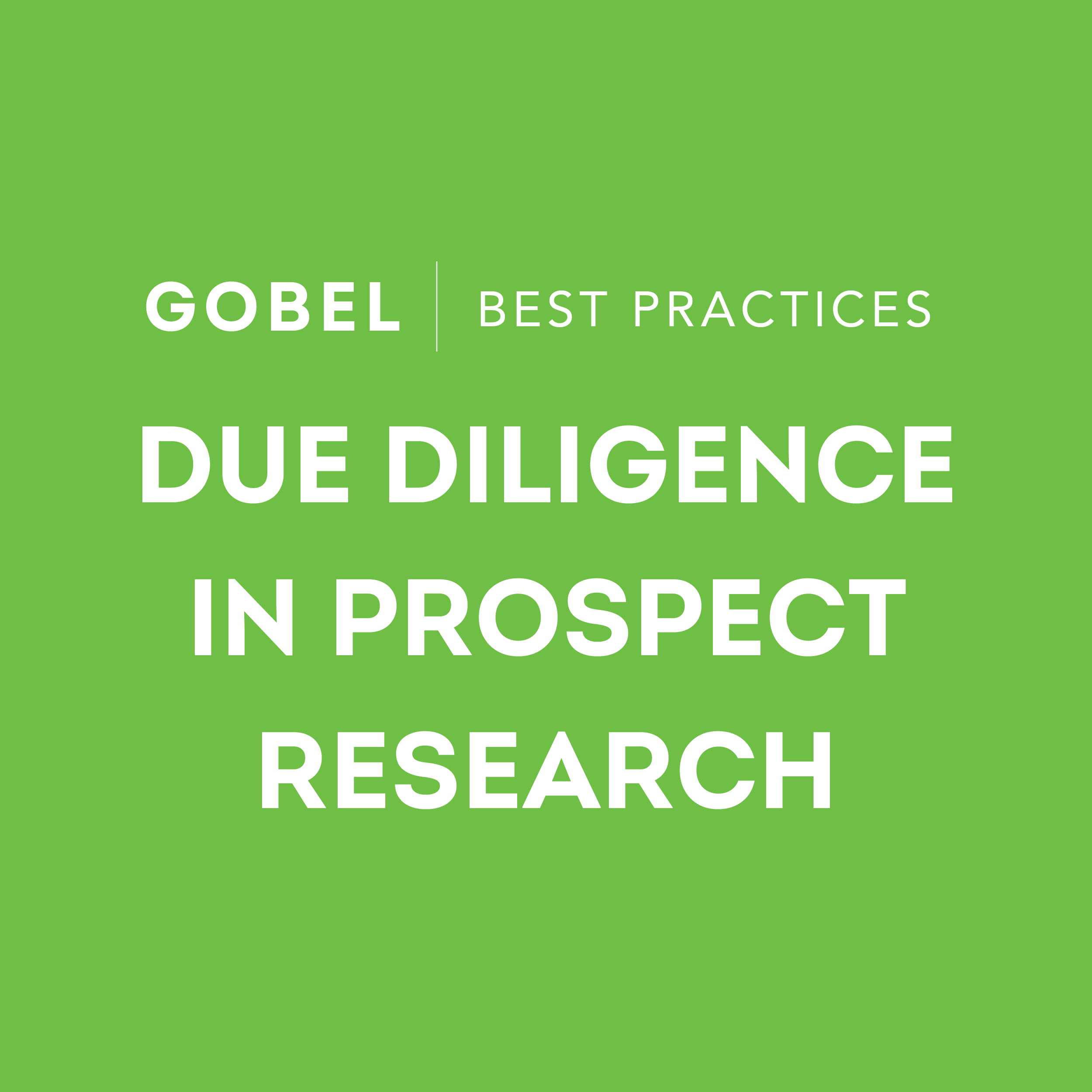
Best Practices: Due diligence in prospect research
BY Jennifer Moody
Did you know that, according to the 2019 “The Next Generation of American Healthcare Giving” report by the Blackbaud Institute, nearly 60% of donors actively research how an organization spends its money and achieves its mission before they donate? Yet few organizations can currently say they do the same level of due diligence on their donors.
What is due diligence?
The purpose of due diligence, or vetting research, is to ensure that the donor does not have former, current, or future legal, criminal, or moral/ethical concerns or connections that would result in an undesirable association, thereby damaging your organization’s reputation and/or credibility. In short, traditional prospect research may answer the question, “Does the prospect have the ability to make a gift at a certain level?” But due diligence answers the question, “Should the organization accept a gift from this prospect?”
Thoughtful due diligence research and discussion will consider whether engaging with a potential volunteer or accepting a donation could expose the organization to legal or regulatory challenges, jeopardize the organization’s ability to raise money in the future, give the perception of inappropriateness by community members, or give an individual influence over a program or project.
When should your organization complete due diligence research?
Does your organization have a due diligence policy? If so, that should clearly define when due diligence is completed and should go hand-in-hand with your organization’s gift acceptance policy, which should, for example, outline when your organization is able to remove a name from a building or fund. Some of the most common triggers to completing due diligence research include new board members, naming opportunities, gifts over a certain dollar amount, larger gifts from prospects not known to the organization, or international prospects.
What are some common reasons a prospect may be flagged in due diligence research?
Whether a prospect is flagged can often depend on an organization’s mission and priorities. For example, healthcare organizations frequently won’t accept donations from tobacco companies – but would they accept board service or money from an individual who made their money in the tobacco industry? In 2005, Dana- Farber Cancer Institute appointed tobacco company exec Bennett LeBow to its Board of Trustees. LeBow stepped down after less than 45 days when questions were raised about the link between his corporate career and Dana-Farber’s mission.
The link does not always have to be directly tied to the organization’s mission. In 2020, in the aftermath of the murder of George Floyd, Detroit Pistons owner Tom Gores stepped down from the Los Angeles County Museum of Art Board of Trustees over his company’s ownership of a telecommunications company profiteering off prison inmates. The move came after the institution received pressure from artists and art supporters.
Given the nuances of due diligence research, the prospect research team may want to review areas such as:
- A history of arrests or lawsuits
- Publicly reported personal scandals
- Connections to controversial industries (tobacco, fossil fuels, pharmaceutical companies)
- Significant public criticism around controversial business decisions
- Family connections to controversial figures
- Connections to international figures or nations with controversial political histories
Who makes the final decision to accept a gift?
Each institution will need to craft its own approach to a due diligence process. Best practices call for an internal prospect research team to prepare summary information on any potential liabilities; however, that team should not make the decision on whether to accept a gift. The final decision maker should be outlined in your organization’s due diligence policy. It may make sense for the Chief Development Officer or President of the foundation to make the final decision, or your organization may have a Gift Acceptance Committee (that may include development staff, public relations, finance, etc.). Some organizations may choose to present difficult findings to their board first, for their input on how to proceed.
Due diligence may seem like an overwhelming undertaking to begin, however, protecting your organization’s ability to complete its mission by protecting its reputation is key to your organization’s longevity. Remember, to some extent, your prospect research team may already be incorporating some of these practices into its everyday work – for example, those team members are likely scanning news articles when they are researching major donors. If you’re unsure where to begin, having a thoughtful conversation around the beginnings of a due-diligence policy, recognizing that your policy will grow and change as your organization evolves, is an excellent place to start.
